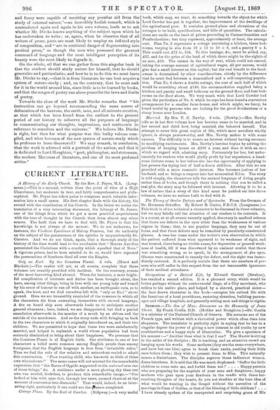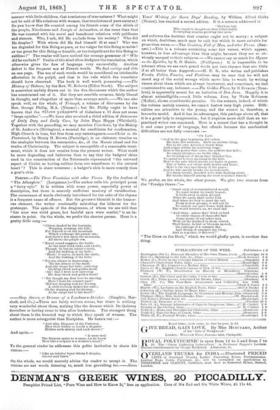SzRuoas.—The Son of Man: Discourses on the Humanity of Jesus
Christ. By Frank Conlin, D.D. (Hodder and Stoughton.)—Dr. Conlin is a minister of the National Church of Geneva. His sermons are of the French type, and written with a rhetorical power which often rises into eloquence. The translator is perfectly right in saying that he has in a singular degree the power of giving a new interest to old truths by new combinations and a happy style of illustration. We give a specimen of his manner :—" Another time what is that I see ? The Master is sitting in the midst of his disciples ; He is teaching, and an attentive crowd are hanging upon his words. Some mothers (they are the same everywhere, and have but one idea) agree to break their ranks, pushing their little ones before them ; they wish to present them to Him. This naturally causes a disturbance. The disciples reprove these indiscreet women. Jesus interferes. It is said that He was much displeased. Suffer the little children to come unto me, and forbid them not !' . . . . Happy parents who are preparing for the nuptials of your sons and daughters ; happy mothers who gaze upon your firstborn in the cradle with those far- reaching thoughts of the hearts, do you not shudder at the bare idea of what would be wanting in the Gospel without the narrative of the marriage in Cana of Galilee, or that of the blessing of little children? . . . I have already spoken of the unexpected and surprising grace of His
manner with little children, that touchstone of true natures ? What might not be said of His relations with women, that touchstone of pure natures? Do you know that He counted among his friends some of the chiefs of the people, Nicodemus and Joseph of Arimathea, at the same time that He was taunted with his novel and beneficent relations with publicans and sinners. Who, I ask, did He exclude from his society ? Who did He despise ? With whom did He find himself ill at ease ? Who was too degraded for this Being so pure, or too vulgar for this Being so noble ? or too great for this Being so humble, or too insignificant for this Being so sublime ?" The reader will have noticed the strange grammar of " Who did he exclude ?" Faults of this kind often disfigure the translation, which otherwise gives the flow of language very successfully. Another defect is the frequent use of French words. We find cortege and elite on one page. The use of such words would be considered an intolerable affectation in the pulpit, and that is the role which the translator should have observed. The book is well worth possessing.—The History of Balaam, by the Rev. W. Roberts (Elliot Stock). The subject is somewhat unduly drawn out in the five discourses which the author has constructed out of it. But they are sensible sermons, fairly liberal in thought, and altogether of more than average merit.—We can also speak well, on the whole, of Triumph, a volume of discourses by the Rev. George Philip. M.A. (Nimmo) ; but Mr. Philip ought to have known that the IriiXtzcs yptipintsvot of Galatians v. 11 does not mean "large epistles."—We have also received a third edition of Discourses of Daily Duty and Daily Care, by John Page Hoppe (Whitfield). Together with the preceding, we may mention Ca techesis, by the Bishop of St. Andrew's (Rivington), a manual for candidates for confirmation, High Church in tone, but free from any extravagance.—Christ in the Pentateuch, by Henry H. Brown (Partridge), is an elaborate treatise on the analogies between the ceremonies, dm., of the Mosaic ritual and the truths of Christianity. The subject is susceptible of a reasonable treat- ment, which it does not receive from the present writer. What could be more degrading and ludicrous than to say that the badgers' skins used in the construction of the Tabernacle represented "the outward aspect of Christ, as having neither form nor comeliness to the natural heart"? This is sheer nonsense a badger's skin is more comely than a goat's skin.































 Previous page
Previous page